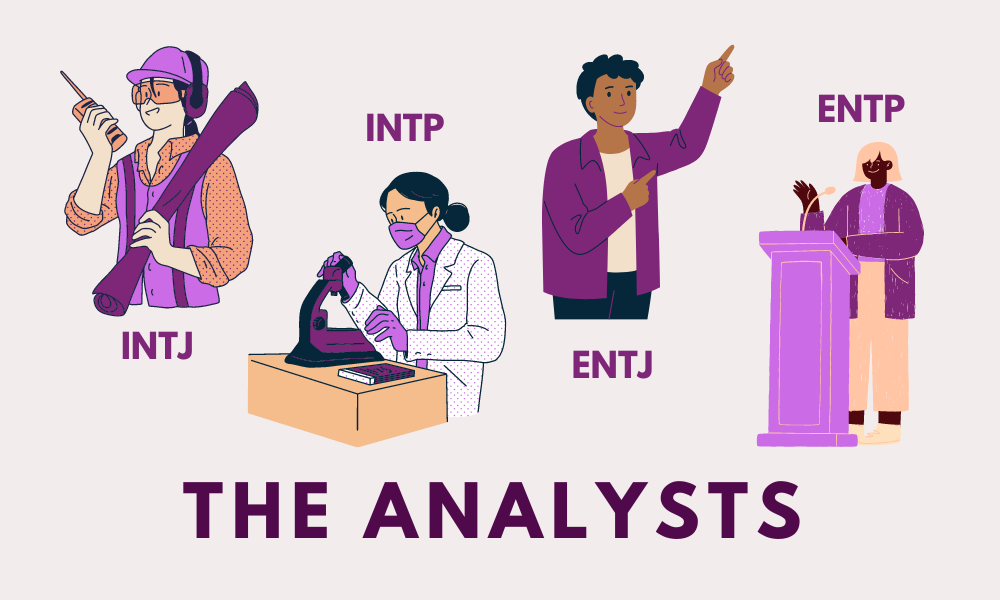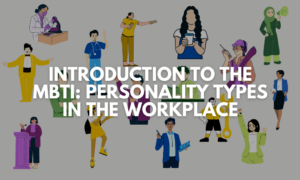Welcome back to our MBTI series!
Today, we’re diving into the first group in the MBTI family: the Analysts. This fascinating group includes the “NT” types: INTJ, INTP, ENTJ, and ENTP. Known for their strategic thinking and love of intellectual challenges, Analysts bring a unique and powerful dynamic to the workplace.
If this is your first time hearing about the MBTI, be sure to check out our previous post to learn what those letter combinations mean. For those familiar with MBTI, get ready to explore what makes Analysts tick.
Have you ever marveled at someone who seems to anticipate potential pitfalls in a project or who can think of out-of-the-box solutions? If so, you’ve likely witnessed an Analyst in action. Analysts thrive on tackling complex problems and aren’t afraid to push boundaries to achieve their goals. Their minds are their most powerful tool, which often means their hearts take a backseat—or are entirely disregarded. But just because they favor information over emotional expression doesn’t mean they aren’t great friends, parents, and coworkers.
Curious about your personality type or that of someone you know? Let’s take a closer look at the four Analyst types!
INTJ: The Architect or Conceptual Planner
The Architect, or Conceptual Planner, can seem like an enigma to the untrained eye. They tend to keep to themselves, preferring solitude, which can make them appear cold and distant. However, once you get to know an Architect, you’ll be in awe as you watch them work.
This personality type is known for being incredibly curious, skeptical, and strategic, making them a force to be reckoned with in the workplace. Their world is an intricate web of connections that evolves with every new piece of information they gather—much like how a spider meticulously weaves its web.
INTJs excel in areas where they can use their brilliant minds to solve problems, often dismissing the need to get to know their coworkers. They’re not cold-hearted by any means; they simply find more purpose in meeting their goals than in climbing the social ladder.
As an INTJ, your strengths—thinking rationally, staying informed, working independently, having a unique sense of determination, and coming up with out-of-the-box creative ideas—make you an incredible addition to any team. However, to truly shine, you must understand that investing time in areas where you may fall short can help you meet your own high expectations.
While small talk isn’t your idea of productivity, engaging in it can open you up to new opportunities to apply your skills. Imagine how much more effective your brilliant ideas could be if they were communicated to the right people. Your knack for creativity often flies under the radar, even though it’s one of your greatest strengths. Don’t hesitate to share your one-of-a-kind ideas; they could save a project from disaster.
INTP: The Logician or The Thinker
The Logician, or Thinker, is bursting with creativity and imagination, so much so that their brain is overflowing with ideas, theories, and questions that they can’t wait to share. They’re known for their intellectual and analytical nature, but unlike the Architect, they’re more open-minded when it comes to changing their opinion.
With their introverted nature, they don’t love socializing and prefer to stick to themselves. Instead, their best friend—and worst enemy—is their mind. Their brain is incredibly quick and vast, which is why they excel in the STEM field. However, the speed at which they generate ideas, problems, solutions, and thoughts can sometimes overwhelm them.
Nonetheless, their endless curiosity is a professional asset. They love diving into complex topics where they can show off their wealth of knowledge. The unique thing about this personality type is that they’re not afraid to be wrong once they learn something new. Instead, they use that information to enhance their arsenal.
While your strengths as an INTP make you an essential addition to any team, making a true impact will require you to understand where you can improve. INTPs are hyper-independent, which can make teamwork challenging.
Engaging in team-building exercises, small talk, and social acceptance may not top your priority list, but embracing these aspects can be the key to unlocking new opportunities. By making valuable connections and collaborating with others, you can move beyond mundane tasks and truly tap into your full potential.
Consider how much more you could learn if you had someone to bounce ideas off of. Teamwork and collaboration could unlock new insights and push your intellectual boundaries even further. Investing in your social networks can bring immense value to your professional growth.
ENTJ: The Commander or CEO
The Commander, or CEO, is exactly as their name suggests: a leader by design. These personality types thrive in positions where they can identify potential in others and build a team that will help them reach their goals.
Commanders are determined to succeed and do so in a passionate manner that often inspires those around them to do the same. As an extroverted type, they are energized by social interaction and enjoy working with people who share their love of challenges.
At work, Commanders are often the first to volunteer for new projects. They likely lead discussions and play a valuable role in brainstorming sessions. They know what they want and use clear communication to get there.
While clear communication is a highly sought-after soft skill in the professional world, Commanders’ communication style can sometimes be too blunt, coming across as rude or nitpicky. As an ENTJ, your leadership and excitement can easily turn into arrogance and stubbornness if not managed carefully. Make sure that while you clearly see the road ahead, you aren’t running people over in the process of getting there.
The “NT” types are not known for being in touch with their emotions or expressing them constructively. For an ENTJ, this can be a point of growth. Tapping into your emotional side can help you maintain control of a situation and push you forward in the right way to achieve your goals.
Consider how much more inspiring your leadership could be if it included empathy and emotional intelligence. This balance can make you an even more effective leader who not only drives success but also fosters a positive work environment.
ENTP: The Debater or Visionary
Last but not least, the Debater, or Visionary, is known for their conversationalism and innovation. As their name suggests, they aren’t shy about pointing out flaws or holes in others’ arguments. They’re quick-witted, curious, and thrive on change, making them invaluable to teams seeking new outcomes.
As a prospecting type, ENTPs aren’t tied to one way of doing things. You can often find them experimenting with new methods just to challenge themselves to understand something in another way. They have a deep desire to get to the root of why things are the way they are—whether it’s systems, people, or the way things work. Their minds are always churning, which means their environment can sometimes struggle to keep up.
The speed at which ENTPs process information can make them a bit intolerant of those who take longer to work through things. Their argumentative nature can sometimes tip into the negative, but this is because they can spot inconsistencies before anyone else.
As proud Analysts, these personality types favor facts and logic over emotions, which serves them well when things turn controversial. However, glossing over others’ emotional reasoning can lead to conflicts, especially with management or coworkers. If you’re an ENTP, remember that this is your biggest area for growth.
This personality type is brimming with innovative ideas, but they can struggle with bringing these ideas to completion. For all prospecting types, this is a common challenge, but for ENTPs, if you approach these big ideas with the same methodical approach you use in conversations, you’ll be golden.
Conclusion
As an overarching category, Analysts are known for their abstract thinking and active thought processes. As an Analyst, you are an essential part of your workplace team. Understanding the four unique aspects of your personality type—Energy, Mind, Nature, and Tactics—will help you grow in your role and understand why you may not be advancing as quickly as you’d like.
Before you go, take a moment to reflect on your own personality type. Which Analyst type do you identify with? How does it influence your work and interactions with others? Share your thoughts in the comments below!
Our next group will be the Diplomats, which includes the Intuitive Feeling “NF” types: INFJ, INFP, ENFJ, and ENFP. Stay tuned for our deep dive into these personality types in the coming weeks!
Check out our other personality pieces!
Have you followed us on social media?
To download our new app, check out our Linktree!
About LGC
Since 2003 LGC has been building connections between businesses with staffing needs and job seekers looking for new opportunities. Our range of solutions includes temporary and permanent placements (and everything in between) for a variety of industries. With offices located nationwide, we can tap into a dynamic pool of talented professionals. We have a passion for creating partnerships that last and work hard every day to ensure both clients and candidates reach their employment goals.





